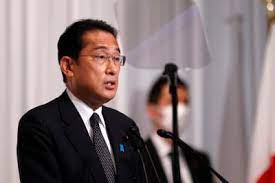Tokyo, July 11: Boosted by a new election mandate, Japanese Prime Minister Fumio Kishida on Monday called for party unity for political stability and to achieve the assassinated former leader Shinzo Abe’s unfinished goals of strengthening the military and revising the war-renouncing constitution.
Kishida’s governing Liberal Democratic Party and its junior coalition partner Komeito secured a solid majority of seats in the parliament’s upper house in elections Sunday that were imbued with meaning after Abe was shot to death while campaigning Friday.
Kishida welcomed the victory but also acknowledged that unifying the party will be a hard task without Abe, who even after resigning as prime minister in 2020 had led a powerful party faction.
“Because we’ve lost a great leader, undeniably we could be affected in many ways,” Kishida said. “Our party must unite as we face difficult issues.”
At a time of security and economic challenges in and outside Japan, Abe’s death is most regrettable, Kishida said. “We will inherit his will and tackle the issues he had to leave unachieved,” including an amendment to the US-drafted postwar pacifist constitution.
Sunday’s vote gave the LDP-led coalition 146 seats in the 248-seat upper chamber, the less powerful of parliament’s two houses. The result means Kishida could rule uninterrupted until a scheduled election in 2025 and allows him to work on long-term policies.
Advancement on amending the constitution is now a realistic possibility. With the help of two opposition parties supportive of a charter change, the governing bloc now has two-thirds majority in the upper chamber needed to propose an amendment. The governing bloc already had the needed support in the lower house.
Earlier Monday, US Secretary of State Antony Blinken met with Kishida to offer condolences and deliver a letter from President Joe Biden to Abe’s family.
“We simply want them to know that we deeply feel the loss on the personal level as well,” Blinken told Kishida. “Mostly I’m here because the United States and Japan are more than allies — we are friends.”
Blinken said Abe “did more than anyone to elevate the relationship between the United States and Japan to new heights.”
Blinken was the highest-ranking US official to visit Japan in the aftermath of Abe’s death. The wake and funeral for Japan’s longest-serving political leader are expected in coming days.
Abe, 67, stepped down as prime minister two years ago, citing health reasons. He said he regretted leave many of his goals unfinished, including revising a constitution that some ultra-conservatives consider a humiliation.
He was the grandson of another prime minister and became Japan’s youngest prime minister in 2006, at age 52. The overly nationalistic stint in office abruptly ended a year later, also because of his health, prompting six years of annual leadership change.
He returned to the premiership in 2012, vowing to revitalize the nation and get its economy out of its deflationary doldrums with his “Abenomics” formula, which combines fiscal stimulus, monetary easing and structural reforms. He won six national elections and built a rock-solid grip on power.
On Sunday, the suspect accused of his murder was transferred to a local prosecutors’ office for further investigation, and a top regional police official acknowledged possible security lapses allowed the gunman to get close to Abe.
The suspect, Tetsuya Yamagami, told investigators he acted because of Abe’s rumoured connection to an organisation that he resented, police said. Some Japanese media identified the group as the Unification Church. (AP)


